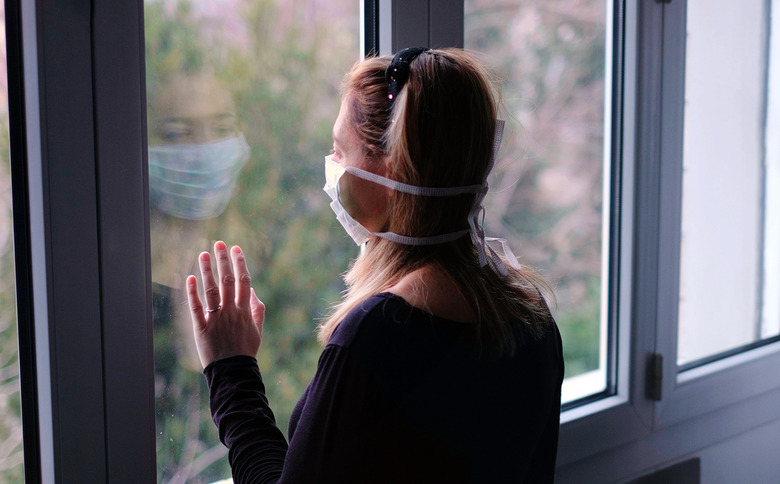Germany Has An Unusual New Trick For Fighting Coronavirus Indoors
- Germany has set new safety measures in place to fight off the second wave of the novel coronavirus pandemic, including a brand new practice that's accessible to anyone.
- In addition to the usual distancing, hand hygiene, and mask advice, Germany insists that people keep airing indoor spaces frequently.
- The coronavirus spreads through droplets and aerosols, especially in indoor spaces. That's where good ventilation might come in handy.
The novel coronavirus is raging with renewed intensity now that the cold is setting in. The US has been facing an increased number of daily cases in the past few weeks, just as most European countries have witnessed their own COVID-19 counts go higher. Unlike America, which hasn't flattened the first wave's curve, most EU nations had a more relaxed summer. European governments are bracing for wave two, readying new measures to control the infection. The Czech Republic is considering a second lockdown, just as Spain imposed a state of emergency on Madrid. The French capital also faces a new lockdown of its own, as the COVID-19 outbreak is getting out of control in Paris.
Germany is one of the developed countries that handled the first wave of the pandemic with positive results. The country employed an ample testing campaign to find infected people early, and while hundreds of thousands of people tested positive, it managed to keep the death rate under 10,000. Chancellor Angela Merkel announced a few weeks ago new strategies to stop the second wave, including localized restrictions and fines that would allow the government to deal with local hotspots rather than placing the entire country in lockdown. It turns out that Germany is promoting five safety measures to reduce the transmission of the virus. You might be familiar with three of those, and you can't control a fourth. But Germany has a brand new, unexpected trick for fighting COVID-19 that you can start applying right away, no matter where you are.
The German government had three simple guidelines to combat the virus's spread, under the acronym AHA, which stands for social distancing, hygiene, and face masks (in German). These are the same health measures that any health official would promote, regardless of country. The virus spreads via droplets and aerosols, and these three measures can reduce the risk of transmission.
That acronym has now become AHACL, which doesn't roll off the tongue quite as easily. As The Guardian explained, the "C" stands for the coronavirus warning app the government developed. A contact tracing app for COVID-19 can somewhat automate the process of keeping track of potential contacts. Enrollment in such apps is voluntary, and those that are built on the joint Apple-Google API would work across the world. But it's up to governments to develop the apps and promote them. Even if you wanted to use a contact tracing app, you really can't do it on your own.
The "L" is more interesting. It stands for "Lüften," which means airing a room. If it suddenly makes sense, that's because the novel coronavirus spreads via the air. The WHO and CDC have already acknowledged that the coronavirus spreads via aerosols, stopping short from promoting clear guidelines that would underscore the importance of airborne transmission. Good ventilation combined with the "AHA" measures should further reduce the risk of COVID-19 infection indoors, and that's what the German government seems to be thinking.
"Regular impact ventilation in all private and public rooms can considerably reduce the danger of infection," the official recommendations explain.
The Guardian explains that Germany already has a practice in place called "Stosslüften," which involves opening a window in the morning and evening for at least five minutes to allow the air to circulate. "Querlüften "is a different concept that refers to creating a draft via cross ventilation, which would force the old air out and fresh air in.
The practice of airing homes has come into its own, as it became clear that 90% of coronavirus patients got the virus indoors. Even with the arrival of winter, experts insist that people keep doing it.
Germany's Fauci equivalent Dr. Christian Drosten dedicated an edition of his pandemic podcast to the importance of air rarefaction and movement, where he talked about the importance of frequent airing. The weekly Die Zeit paper reserved 10 pages to a feature on ventilation a few weeks ago, explaining how to do it in winter.
The frequent airing of homes, offices, schools, and indoor spaces used by multiple people is an easy habit to pick up that might prove to save lives during the pandemic. Allowing the air to circulate will force those aerosols in the air that might carry active coronavirus particles to settle down faster. Guidelines aren't necessary for airing your own home, and you won't know right away whether it works or not. But anyone can develop their own frequent airing schedule for their home and apply it often, especially when people visit.
